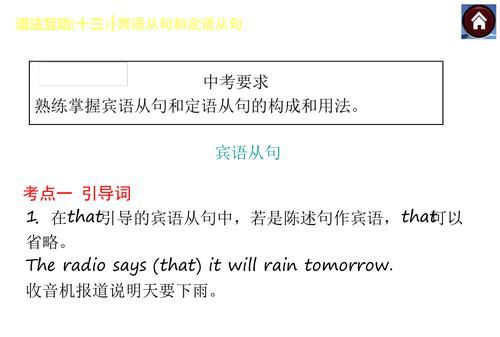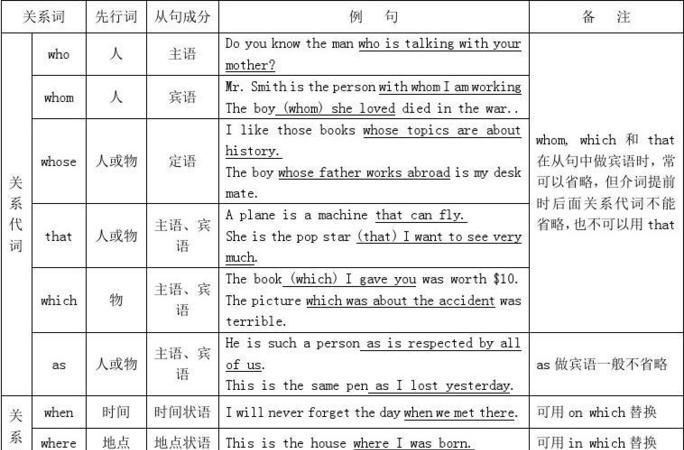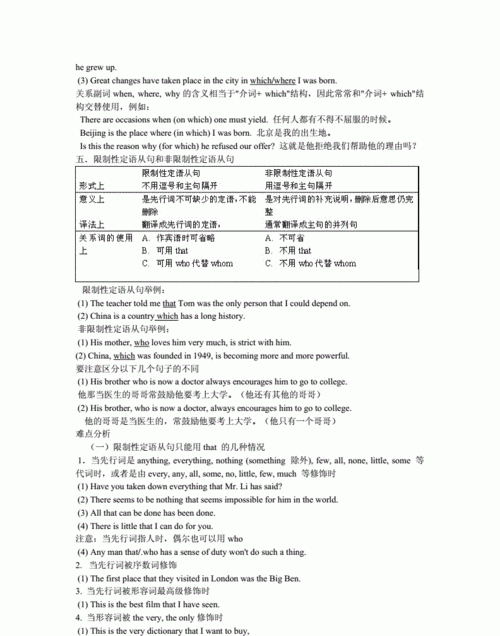本文目录
九年级定语从句知识点笔记
正确答案:
定语从句: 在复合句中修饰名词或代词的句子在复合句中充当定语,所以叫作定语从句。
先行词: 定语从句所修饰的名词或代词。
关系词: 引导定语从句的词,分为关系代词(who,whom,that,which,whose)和关系副词(where,when,why,)。
例如:
I know the girl whose hair is yellow.
解析“先行词为the girl,引导词即关系词为whose,且在从句中做定语。whose hair is yellow.是定语从句。
The man who is reading is my brother.
解析:先行词为the man,关系词为who,且在从句中做主语。 who is reading是定语从句,修饰the man。
不懂可以再问。

人教版九年级英语定语从句讲解
定语从句(Attributive Clauses)在句中做定语,修饰一个名词或代词,被修饰的名词,词组或代词即先行词。定语从句通常出现在先行词之后,由关系词(关系代词或关系副词)引出。
关系代词有:who, whom, whose, that, which等。
关系副词有:when, where, why等。
18.1 关系代词引导的定语从句
关系代词所代替的先行词是人或物的名词或代词,并在句中充当主语、宾语、定语等成分。关系代词在定语从句中作主语时,从句谓语动词的人称和数要和先行词保持一致。
1)who, whom, that
这些词代替的先行词是人的名词或代词,在从句中所起作用如下:
Is he the man who/that wants to see you?
他就是你想见的人吗?(who/that在从句中作主语)
He is the man whom/ that I saw yesterday.
他就是我昨天见的那个人。(whom/that在从句中作宾语)
2) Whose 用来指人或物,(只用作定语, 若指物,它还可以同of which互换), 例如:
They rushed over to help the man whose car had broken down. 那人车坏了,大家都跑过去帮忙。
Please pass me the book whose (of which) cover is green. 请递给我那本绿皮的书。
3)which, that
它们所代替的先行词是事物的名词或代词,在从句中可作主语、宾语等,例如:
A prosperity which / that had never been seen before appears in the countryside. 农村出现了前所未有的繁荣。(which / that在句中作宾语)
The package (which / that) you are carrying is about to come unwrapped. 你拿的包快散了。(which / that在句中作宾语)
18.2 关系副词引导的定语从句
关系副词可代替的先行词是时间、地点或理由的名词,在从句中作状语。
1)when, where, why
关系副词when, where, why的含义相当于"介词+ which"结构,因此常常和"介词+ which"结构交替使用,例如:
There are occasions when (on which) one must yield. 任何人都有不得不屈服的时候。
Beijing is the place where (in which) I was born. 北京是我的出生地。
Is this the reason why (for which) he refused our offer? 这就是他拒绝我们帮助他的理由吗?
2)that代替关系副词
that可以用于表示时间、地点、方式、理由的名词后取代when, where, why和"介词+ which"引导的定语从句,在口语中that常被省略,例如:
His father died the year (that / when / in which) he was born. 他父亲在他出生那年逝世了。
He is unlikely to find the place (that / where / in which) he lived forty years ago. 他不大可能找到他四十年前居住过的地方。
18.3 判断关系代词与关系副词
方法一: 用关系代词,还是关系副词完全取决于从句中的谓语动词。及物动词后面无宾语,就必须要求用关系代词;而不及物动词则要求用关系副词。例如:
This is the mountain village where I stayed last year.
I'll never forget the days when I worked together with you.
判断改错(注:先显示题,再显示答案,横线;用不同的颜色表示 出。)
(错) This is the mountain village where I visited last year.
(错) I will never forget the days when I spent in the countryside.
(对) This is the mountain village (which) I visited last year.
(对) I'll never forget the days (which) I spent in the countryside.
习惯上总把表地点或时间的名词与关系副词 where, when联系在一起。此两题错在关系词的误用上。
方法二: 准确判断先行词在定语从句中的成分(主、谓、宾、定、状),也能正确选择出关系代词/关系副词。
例1. Is this museum ___ you visited a few days age?
A. where B. that C. on which D. the one
例2. Is this the museum ____ the exhibition was held.
A. where B. that C. on which D. the one
答案:例1 D,例2 A
例1变为肯定句: This museum is ___ you visited a few days ago.
例2变为肯定句: This is the museum ___ the exhibition was held.
在句1中,所缺部分为宾语,而where, that, on which都不能起到宾语的作用,只有the one既做了主句的表语,又可做从句的宾语,可以省略关系代词,所以应选D。
而句2中, 主、谓、宾俱全,从句部分为句子的状语表地点,既可用副词where,又因 in the museum词组,可用介词in + which 引导地点状语。而此题中,介词on 用的不对,所以选A。
关系词的选择依据在从句中所做的成分,先行词在从句中做主、定、宾语时,选择关系代词 (who, whom, that, which, whose); 先行词在从句中做状语时,应选择关系副词 ( where 地点状语,when 时间状语,why 原因状语) 。
18.4 限制性和非限制性定语从句
1) 定语从句有限制性和非限制性两种。限制性定语从句是先行词不可缺少的部分,去掉它主句意思往往不明确;非限制性定语从句是先行词的附加说明,去掉了也不会影响主句的意思,它与主句之间通常用逗号分开,例如:
This is the house which we bought last month. 这是我们上个月买的那幢房子。(限制性)
The house, which we bought last month, is very nice.这幢房子很漂亮,是我们上个月买的。(非限制性)
2) 当先行词是专有名词或物主代词和指示代词所修饰时,其后的定语从句通常是非限制性的,例如:
Charles Smith, who was my former teacher, retired last year. 查理•史密斯去年退休了,他曾经是我的老师。
My house, which I bought last year, has got a lovely garden. 我去年买的的那幢房子带着个漂亮的花园。
This novel, which I have read three times, is very touching. 这本小说很动人,我已经读了三遍。
3) 非限制性定语从句还能将整个主句作为先行词, 对其进行修饰, 这时从句谓语动词要用第三人称单数,例如:
He seems not to have grasped what I meant, which greatly upsets me. 他似乎没抓住我的意思,这使我心烦。
Liquid water changes to vapor, which is called evaporation. 液态水变为蒸汽,这就叫做蒸发。
说明:关系代词that和关系副词why不能引导非限制性定语从句。
18.5 介词+关系词 P>
1)介词后面的关系词不能省略。
2)that前不能有介词。
3) 某些在从句中充当时间,地点或原因状语的"介词+关系词"结构可以同关系副词when 和where 互换。
This is the house in which I lived two years ago.
This is the house where I lived two years ago.
Do you remember the day on which you joined our club?
Do you remember the day when you joined our club?
18.6 as, which 非限定性定语从句
由as, which 引导的非限定性定语从句,as和which可代整个主句,相当于and this或and that。As一般放在句首,which在句中。
As we know, smoking is harmful to one's health.
The sun heats the earth, which is very important to us.
典型例题
1)Alice received an invitation from her boss, ___came as a surprise.
A. it B. that C. which D. he
答案C. 此为非限定性从句,不能用 that修饰,而用which.,it 和he 都使后句成为句子,两个独立的句子不能单以逗号连接。况且选he句意不通。
2)The weather turned out to be very good, ___ was more than we could expect.
A. what B. which C. that D. it
答案B。which可代替句子,用于非限定性定语从句,而what不可。That 不能用于非限定性定语从句,it不为连词,使由逗号连接的两个句子并在一起在英语语法上行不通。
3)It rained hard yesterday, ____ prevented me from going to the park..
A. that B. which C. as D. it
答案B.
as 和which在引导非限制性定语从句时,这两个关系代词都指主句所表达的整个意思,且在定语从句中都可以作主语和宾语。但不同之处主要有两点:
(1) as 引导的定语从句可置于句首,而which不可。
(2) as 代表前面的整个主句并在从句中作主语时,从句中的谓语必须是系动词;若为行为动词,则从句中的关系代词只能用which.。
在本题中,prevent由于是行为动词,所以正确选项应为B。
As 的用法
例1. the same… as;such…as 中的as 是一种固定结构, 和……一样……。
I have got into the same trouble as he (has).
例2. as可引导非限制性从句,常带有'正如'。
As we know, smoking is harmful to one's health.
As is know, smoking is harmful to one's health.
As是关系代词。例1中的as作know的宾语;例2中,它充当从句的主语,谓语动词know要用被动式。
18.7 先行词和关系词二合一
1)Whoever spits in public will be punished here.
(Whoever 可以用 anyone who 代替)
2)The parents will use what they have to send their son to technical school.
(what 可以用all that代替)
18.8 what/whatever;that/what; who/whoever
1)what = the thing which;whatever = anything
What you want has been sent here.
Whatever you want makes no difference to me.
2) who= the person that whoever= anyone who
(错)Who breaks the law will be punished.
(错)Whoever robbed the bank is not clear.
(对)Whoever breaks the law will be punished.
(对)Who robbed the bank is not clear.
3) that 和 what
当that引导定语从句时 ,通常用作关系代词,而引导名词性从句时,是个不充当任何成分的连接词。宾语从句和表语从句中的that常可省略。What只能引导名词性从 句, 用作连接代词,作从句的具体成分,且不能省略。
I think (that) you will like the stamps.
What we need is more practice.
18.9 关系代词that 的用法
1)不用that的情况
a) 在引导非限定性定语从句时。
(错) The tree, that is four hundred years old, is very famous here.
b) 介词后不能用。
We depend on the land from which we get our food.
We depend on the land that/which we get our food from.
2) 只能用that作为定语从句的关系代词的情况
a) 在there be 句型中,只用that,不用which。
b) 在不定代词,如:anything, nothing, the one, all, much, few, any, little等作先行词时,只用that,不用which。
c) 先行词有the only, the very修饰时,只用that。
d) 先行词为序数词、数词、形容词最高级时,只用that。.
e) 先行词既有人,又有物时。
举例:
All that is needed is a supply of oil.
所需的只是供油问题。
Finally, the thief handed everything that he had stolen to the police.
那贼最终把偷的全部东西交给了警察。

初三定语从句专练题及答案
1.The man who talked to you just now is an engineer.
刚才和你说话的那个人是一位工程师。
1.I enjoyed the evening that we spent together by the sea.
我们一起在海边度过的那个晚上,我过的很愉快。
1.Here is the pen that you lost the day bofore yesterday.
这是你前天丢失的那支笔。
1.He is the person I meet in the park yesterday.
他就是我昨天在公园里遇到的那个人。
1.The lady who came to our class is from Australia.
那位来过我们班的女士来自澳大利亚。
1.The man who shook hands with our teacher just now is Li Lei’s father.
刚才和我们老师握手的那个人是李雷的父亲。
1.The book you need is sold out.
你需要的那本书卖完了。
1.I’ll never forget the summer holiday I spent with you.
我绝不会忘记和你一起过的那个暑假。
1.She is one of the students in our class who are good at English.
她是我们班上英语很好的学生之一。
1.He is the only one of my friends who comes from a foreign country.
他是我唯一一个来自外国的朋友。

九年级英语定语从句专项训练
定语从句(Attributive Clauses)在句中做定语,修饰一个名词或代词,被修饰的名词,词组或代词即先行词。定语从句通常出现在先行词之后,由关系词(关系代词或关系副词)引出。
1.定语从句:定语从句是由关系代词或关系副词引导的从句,其作用是作定语修饰主句的某个名词性成分,相当于形容词,所以又称为形容词性从句,一般紧跟在它所修饰的先行词后面。
2.关系词:引导定语从句的关联词称为关系词,关系词有关系代词和关系副词。关系代词有that, which, who, whom, whose, as等;关系副词有where, when, why等。关系词常有3个作用:1,引导定语从句。2,代替先行词。3,在定语从句中担当一个成分。
注:关系代词有主语.宾语之分。一般whom作为宾语。
4.定语:定语用来限定、修饰名词或代词的,是对名词或代词起修饰、限定作用的词、短语或句子,汉语中常用‘……的’表示。主要由形容词担任。此外,名词,代词,数词,分词,副词,不定式以及介词短语也可以来担任,也可以由一个句子来担任.单词作定语时通常放在它所修饰的词之前,作前置定语。短语和从句作定语时则放在所修饰的词之后,作后置定语。
先行词:被定语从句修饰的名词、代词称为先行词。
关系代词引导的定语从句举例。
关系代词所代替的先行词是人或物的名词或代词,并在句中充当主语、宾语、定语等成分。关系代词在定语从句中作主语时,从句谓语动词的人称和数要和先行词保持一致。
1、who, whom, that
这些词代替的先行词是人的名词或代词,在从句中所起作用如下:
(1) Is he the man who/that wants to see you? 他就是想见你的人吗?(who/that在从句中作主语)
(2) He is the man whom/ that I saw yesterday. 他就是我昨天见的那个人。(whom/that在从句中作宾语)
2、Whose 用来指人或物,(只用作定语, 若指物,它还可以同of which互换)
(1) They rushed over to help the man whose car had broken down. 那人车坏了,大家都跑过去帮忙。
(2) Please pass me the book whose (of which) cover is green. 请递给我那本绿皮的书。
3、 which, that 它们所代替的先行词是事物的名词或代词,在从句中可作主语、宾语等,例如:
(1) A prosperity which / that had never been seen before appears in the countryside. 农村出现了前所未有的繁荣。(which / that在句中作主语)
(2) The package (which / that) you are carrying is about to come unwrapped. 你拿的包快散了。(which / that在句中作宾语) [编辑本段](一) 限定性定语从句 一、关系代词(在句中作主语、宾语或定语)
1. that既可代表事物也可代表人,which代表事物;它们在从句中作主语或宾语,that在从句中作宾语时常可省略关系词,which在从句中作宾语也可以省略。[eg:this is the book (which)you want。]
2而且,如果which在从句中作“不及物动词+介词”的介词的宾语,注意介词不要丢掉,而且介词总是放在关系代词which的前边,但有的则放在它原来的位置
3. 代表物时多用which,但在带有下列词的句子中用that而不用which,这些词包括当先行词是anything, everything, nothing , none等不定代词时,或者是由every, any, all, some, no, little, few, much等修饰时等,这时的that常被省略 还有先行词前有序数词或形容词最高级修饰时,或先行词就是序数词或最高级时.以及先行词中既有人又有物时.还有句中前面有which时,都只能用that
4. who和whom引导的从句用来修饰人,分别作从句中的主语和宾语,whom作宾语时,要注意它可以作动词的宾语也可以作介词的宾语
5. whose是关系代词,修饰名词作定语,相当于所修饰成分的前置所有格.它引导的从句可以修饰人和物, 当它引导的从句修饰物体时, 可以与 of which 调换,表达的意思一样。
二、关系副词(在句中作状语)
关系副词=介词+关系代词
why=for which
where=in/ at/ on/ ... which (介词同先行词搭配)
when=during/ on/ in/ ... which (介词同先行词搭配)
1. where是关系副词,用来表示地点的定语从句。
2. when引导定语从句表示时间[注]值得一提的是,表示时间“time"一词的定语从句只用when引导,有时不用任何关系代词,当然也不用that引导。
By the time you arrive in London, we will have stayed there for two weeks. I still remember the first time I met her. Each time he goes to business trip, he brings a lot of living necessities, such as towels, soap, toothbrush etc。
3. 当从句的逻辑主语是some, any, no, somebody, anybody, nobody, something, anything, everything或nothing时,常用there is来引导
There is somebody here who wants to speak to you. 这里有人要和你说话。 [编辑本段](二)非限定性定语从句 非限定性定语从句的作用是对所修饰的成分作进一步说明,通常是引导词和先行词之间用逗号隔开,将从句拿掉后其他部分仍可成立
1. which引导的非限定性定语从句来说明前面整个句子的情况或主句的某一部分
2.当先行词是专有名词或物主代词和指示代词所修饰时,其后的定语从句通常是非限制性的,例如:
Charles Smith, who was my former teacher, retired last year. 查理·史密斯去年退休了,他曾经是我的老师。
My house, which I bought last year, has got a lovely garden. 我去年买的的那幢房子带着个漂亮的花园。
This novel, which I have read three times, is very touching. 这本小说很动人,我已经读了三遍。
3.非限制性定语从句还能将整个主句作为先行词, 对其进行修饰, 这时从句谓语动词要用第三人称单数,例如:
He seems not to have grasped what I meant, which greatly upsets me. 他似乎没抓住我的意思,这使我心烦。
Liquid water changes to vapor, which is called evaporation. 液态水变为蒸汽,这就叫做蒸发。
4. 有时as也可用作关系代词
5. 在非限定性定语从句中,不能用关系副词why和关系代词that,而用who, whom代表人,用which,whose代表事物.; [编辑本段](三)关系代词引导的定语从句 1.who指人在从句中做主语
(1) The boys who are playing football are from Class One. 在踢足球的男孩们是一班的.
(2) Yesterday I helped an old man who lost his way. 昨天,我帮助了一个迷路的老人.
2. whom指人,在定语从句中充当宾语,常省略。(注:who和whom已无太大区别,基本可以通用。唯一区别是who可以做主语而whom不可以。)
(1) Mr. Liu is the person (whom) you talked with on the bus. 刘先生就是在公交车上和你聊天的那个人.
(2) Mr. Ling is just the boy whom I want to see. 凌先生恰巧就是我想见的那个男孩.
(3) The man who/whom you met just now is my friend. 你刚刚见到的那个人就是我的朋友.
注意:关系代词whom在口语和非正式语体中常用who代替,可省略。
如果在从句中做宾语,就用whom或who.比如: He is the man whom/who I talk to. 他就是那个和我聊天的男人.
如果是在从句中作主语就只能用who.比如: He is the man who has an English book. 他就是那个有英语书的男人.
3.which指物,在定语从句中做主语或者宾语,做宾语时可省略。
(1) Football is a game which is liked by most boys. 足球是大多数男孩都喜欢的游戏.
(2) This is the pen (which) he bought yesterday. 这是他昨天刚买的钢笔.
4. that指人时,相当于who或者whom;指物时,相当于which。
在定语从句中做主语或者宾语,做宾语时可省略。
(5) The number of the people that/who come to visit the city each year rises one million.
(6) Where is the man that/whom I saw this morning?
5. whose通常指人,也可指物,在定语从句中做定语。
(1) He has a friend whose father is a doctor.
(2) I once lived in a house whose roof has fallen in.whose指物时,常用以下结构来代替
(3) The classroom whose door is broken will soon be repaired.
(4) The classroom the door of which is broken will soon be repaired.
(5) Do you like the book whose color is yellow?
(6) Do you like the book the color of which is yellow? [编辑本段](四)注意 介词+关系代词引导的定语从句关系代词在定语从句中做介词宾语时
从句常由介词+关系代词引导
(1) The school (that/which) he once studied in is very famous.
= The school in which he once studied is very famous.
(2) Tomorrow I will bring here a magazine (that/which) you asked for.
= Tomorrow I will bring here a magazine for which you asked.
(3) We’ll go to hear the famous singer (whom/that/who) we have often talked about.
= We’ll go to hear the famous singer about whom we have often talked.
注意:1. 含有介词的动词短语一般不拆开使用,如:look for, look after, take care of等
T This is the watch which/that I am looking for. (T=正确)
F This is the watch for which I am looking. (F=错误)
2. 若介词放在关系代词前,关系代词指人时用whom,不可用who或者that;指物时用which,不能用that;关系代词是所有格时用whose
(1) The man with whom you talked is my friend. (T)
The man with that you talked is my friend. (F)
(2) The plane in which we flew to Canada is very comfortable. (T)
The plane in that we flew in to Canada is very comfortable. (F)
3. “介词+关系代词”前可有some, any, none, both, all, neither, most, each, few等代词或者数词
(1) He loved his parents deeply, both of whom are very kind to him.
(2) In the basket there are quite many apples, some of which have gone bad.
(3) There are forty students in our class in all, most of whom are from big cities.
关系代词
关系代词(一般情况下)that 可用who ,whom 和which在从句做主语,谓动词的宾语,但是不能做介词的宾语。
which指物,在从句中作主语,谓语或宾语;
who在从句中作主语;
whom在从句中宾语;
where在从句中修饰表地点的名词,做地点状语;
when在从句中通常修饰表时间的名词,做时间状语;
why在从句中做原因状语,先行词通常是"reason"
有时why也可用for+which代替。
例:A doctor is a person who looks after people's health.
______ _ _____ _____________________
主语 谓语 先行词 从句
|________________________|
定语从句修饰先行词 [编辑本段](五)关系副词引导的定语从句 1. when指时间,在定语从句中做时间状语
(1) I still remember the day when I first came to the school.
(2) The time when we got together finally came.
2. where指地点,在定语从句中做地点状语
(1) Shanghai is the city where I was born.
(2) The house where I lived ten years ago has been pulled down.
3. why指原因,在定语从句中做原因状语
(1) Please tell me the reason why you missed the plane.
(2) I don’t know the reason why he looks unhappy today.
注意:关系副词引导的从句可以由“介词+关系代词”引导的从句替换
(1) The reason why/ for which he refused the invitation is not clear,
(2) From the year when/in which he was going to school he began to know what he wanted when he grew up.
(3) Great changes have taken place in the city in which./where I was born. [编辑本段](六)判断关系代词与关系副词 方法一: 用关系代词,还是关系副词完全取决于从句中的谓语动词。不及物动词后面无宾语,就必须要求用关系副词或者是介词加关系代词;而及物动词后接宾语,则要求用关系代词。例如:
This is the mountain village where I stayed last year.
I'll never forget the days when I worked together with you.
判断改错(注:先显示题,再显示答案,横线;用不同的颜色表示出。)
(错) This is the mountain village where I visited last year.
(错) I will never forget the days when I spent in the countryside.
(对) This is the mountain village (which) I visited last year.
(对) I'll never forget the days (which) I spent in the countryside.
习惯上总把表地点或时间的名词与关系副词 where, when联系在一起。此两题错在关系词的误用上。
方法二: 准确判断先行词在定语从句中的成分(主、谓、宾、定、状),也能正确选择出关系代词/关系副词。例1. Is this museum ___ you visited a few days ago?
A. where B. that C. on which D. the one
例2. Is this the museum ____ the exhibition was held?
A. where B. that C. on which D. the one答案:
例1 D,例2 A
例1变为肯定句: This museum is ___ you visited a few days ago.例2变为肯定句: This is the museum ___ the exhibition was held.
在句1中,is后应跟表语,只有the one可以,而后面的you visited a few days ago则做one的定语从句。
而句2中, 主、谓、宾俱全,从句部分为句子的状语表地点,既可用副词where,又因 in the museum词组,可用介词in + which 引导地点状语。而此题中,介词on 用的不对,所以选A。
关系词的选择依据在从句中所做的成分,先行词在从句中做主、定、宾语时,选择关系代词 (who, whom, that, which, whose);
先行词在从句中做状语时,应选择关系副词 ( where 地点状语,when 时间状语,why 原因状语) 。 [编辑本段](七)介词+关系词 1)介词后面的关系词不能省略。
2)that前不能有介词。
3) 某些在从句中充当时间,地点或原因状语的"介词+关系词"结构可以同关系副词when ,where和why 互换。 This is the house in which I lived two years ago.
This is the house where I lived two years ago.
Do you remember the day on which you joined our club?
Do you remember the day when you joined our club?
This is the reason why he came late.
This is the reason for which he came late. [编辑本段](八)先行词和关系词二合一 1)Whoever spits in public will be punished here. (Whoever 可以用 anyone who 代替) 2)The parents will use what they have to send their son to technical school. (what 可以用all that代替)
但这两句句子已经不是定语从句了,是名词性从句。因为定语从句一定要有先行词,而名词性从句没有。将“Whoever”、“what”分别用“Anyone who”、“all that”代替后,才是定语从句,先行词分别是“Anyone”、“all”。 [编辑本段](九)as,which引导的非限制性定语从句 由as, which 引导的非限定性定语从句,as和which可代整个主句,相当于and this或and that。As一般放在句首,which在句中。
As we know, smoking is harmful to one's health.
The sun heats the earth, which is very important to us.

以上就是关于九年级英语课本里的定语从句 ,九年级定语从句知识点笔记的全部内容,以及九年级英语课本里的定语从句 的相关内容,希望能够帮到您。
